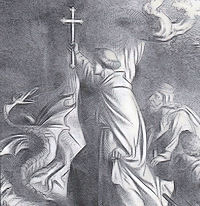
Daily Readings for:September 02, 2014
(Readings on USCCB website)
Collect: God of might, giver of every good gift, put into our hearts the love of your name, so that, by deepening our sense of reverence, and, by your watchful care, keep safe what you have nurtured. Through our Lord Jesus Christ, your Son, who lives and reigns with you in the unity of the Holy Spirit, one God, for ever and ever.
RECIPES
ACTIVITIES
o Religion in the Home for Elementary School: September
o Religion in the Home for Preschool: September
PRAYERS
o September Devotion: Our Lady of Sorrows
· Ordinary Time: September 2nd
· Tuesday of the Twenty-Second Week of Ordinary
Old Calendar: St. Stephen of Hungary, king and confessor; St. Agricolus, bishop (Hist)
According to the 1962 Missal of St. John XXIII the Extraordinary Form of the Roman Rite, today is the feast of St. Stephen of Hungary. His feast in the Ordinary Form of the Roman Rite is celebrated on August 16.
Historically today is the feast of St. Agricolus, son of St. Magnus and bishop of Avignon. He built a church in Avignon to be served by the monks of Lerins and also a convent for benedictine nuns. By his blessing he put an end to an invasion of storks.
St. Agricolus
The son of a Gallo-Roman senator named Magnus, St. Agricolus entered the monastery about the age of 14, possibly after the death of his mother, and acquired a great reputation for piety and learning. Meanwhile, his widowed father, Magnus, received Holy Orders and became a monk. Magnus was named bishop of Avignon 16 years later, and he consecrated his son, who by then had been a priest for quite some time, to become coadjutor bishop. St. Agricolus succeeded his father ten years later and became famous for preaching and aid to the sick and poor. Depicted here with a dragon, St. Agricolus, like Sts. George, Arsacius and Margaret of Antioch, is considered to have done battle with the devil–not utilizing his own weak human will, but shielded with a crucifix, much prayer, fasting and faith in his Redeemer. As bishop of Avignon, St. Agricolus worked all the harder for the sake of his flock. He was named Patron of Avignon in 1647.
Excerpted from 2009 Saints Calendar, Tan Books and Publishers
Patron: Avignon